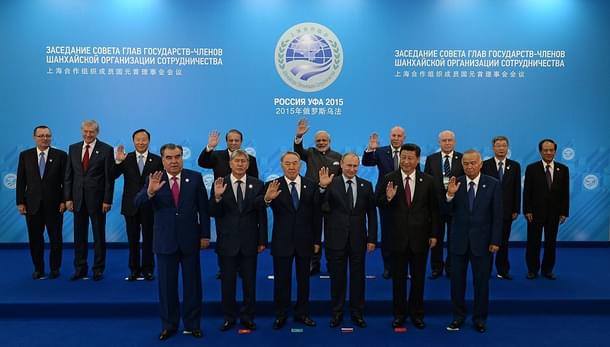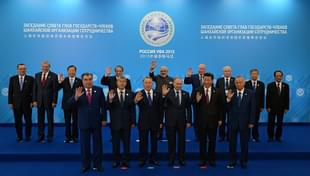Books
Shanghai Cooperation Organisation: Everything You Need To Know About India’s Forthcoming Membership
Ashok Sajjanhar
Apr 26, 2016, 12:06 PM | Updated 12:05 PM IST
Save & read from anywhere!
Bookmark stories for easy access on any device or the Swarajya app.


Why It’s In News
The Shanghai Cooperation Organization (SCO) will witness its first expansion in Membership since its establishment 15 years ago at the forthcoming Summit in Tashkent in June 2016. It was decided at the last Summit in Ufa, Russia in July 2015 to admit India (and Pakistan) to the Organisation. India had become Observer to the Organization at its 5th Summit in Astana, Kazakhstan in 2005.
Since then India had subtly indicated its interest in playing a more substantive role in the development of the Organization. SCO decided in 2009 to focus on its vertical consolidation before embarking on a horizontal expansion. Moratorium on expansion was lifted two years ago after which India formally applied to join the Organization. This will be a momentous occasion for India as well as the Organization.
Background
SCO emerged from Shanghai Five (China, Russia, Kazakhstan, Kyrgyzstan, Tajikistan) which was founded in 1996 after demarcation of China’s borders with the four newly independent States that appeared after the collapse of Soviet Union in 1991. Shanghai Five was established to continue the momentum of friendship in the post-settlement phase. This was transformed into SCO with induction of Uzbekistan at Dushanbe in 2000.
Since its establishment, SCO has concluded several wide-ranging agreements on security, trade and investment, connectivity, energy club, SCO Bank, culture etc. Their implementation, however, remains uninspiring. This is partly because SCO lacks coherence. Having been created at China’s behest with Russian support, SCO is still grappling to evolve as a well-knit entity. Nevertheless, the significance of SCO cannot be underestimated because of the presence of large territorial and economic powers like Russia and China as also due to its geopolitical space.
Why India Matters To SCO?
Membership of India will add further heft and muscle to the Organization particularly in the backdrop of continuing weak international economy. India today is the fastest expanding global economy with annual GDP growth of 7.5%. It represents the third largest economy (USD 8 trillion) in PPP terms and seventh largest (USD 2.3 trillion) in nominal dollar terms. It inspires confidence on other indicators like FDI, inward remittances, savings rate, the pace of economic reforms etc. Its large market, favourable demographics and technological prowess augur well for economies of the world as well as of the grouping. Its growing energy demand will provide an assured market to resource-rich Central Asia and Russia.
What’s In It For India?
Economic agenda of SCO adopted in 2005 has not delivered impressive results. This will also receive an impetus. Terrorism and radicalism are the most formidable challenges confronting international community today.
India has been a victim of terrorist attacks for the last 30 years in which it has lost several thousand innocent children, women and men. Battling with terrorism has provided invaluable experience to Indian security establishment in intelligence gathering, training, foiling terrorist operations etc which it can share with SCO partners. The threat of terrorism to the region is particularly grave on account of continuing violence in Afghanistan which can embolden regional groups like Islamic Movement of Uzbekistan, Hizb-ut-Tahrir etc to destabilise governments in Central Asia.
Scourge of radicalism also looms large over the region with expansion of influence by Islamic State (IS) and reported desertion of several cadres of Taliban, Al Qaeda etc to join the jihadi IS ranks. Several hundred young men and women have fled their homes in Central Asia to bolster ISIS forces that are spreading their tentacles to Central Asia, Pakistan and Afghanistan.
India has an enviable track record in handling these twin scourges. It can share its experience and best practices with SCO members to mutual benefit and advantage.
The Great ‘Central Asia’ Opportunity
Central Asia is part of India’s extended neighbourhood. Its relations with these countries have however failed to realise the enormous potential in enhancing ties in security, political, economy, trade, investment, energy, connectivity, capacity development etc because India does not share common land borders with the region and also because of infrequent visits at the highest level between India and Central Asian States.
India’s membership will provide a welcome opportunity to Indian Prime Ministers to meet with Presidents from Central Asia regularly and frequently. India’s potential participation in the Eurasian Economic Union (EEU) will be an added advantage to make this partnership more fruitful.
Central Asia represents the ‘’near-abroad’’ for Russia. Both India and Russia can collaborate to reciprocal benefit in all above areas. India’s development experience particularly in promoting agriculture, SMEs, pharmaceuticals, IT etc can be of immense benefit to these countries.
India has demonstrated its keen interest in strengthening its multi-faceted relations with Central Asia through the historic visit of PM Modi to the five Central Asian Republics in July 2015. Several Agreements were signed and new initiatives launched. Turkmenistan, Afghanistan, Pakistan, India (TAPI) gas pipeline whose construction commenced in November 2015 represents a shining example of a mutually beneficial project.
Green energy and climate change are other areas where Central Asia and Russia can fruitfully collaborate with India as the world moves away from its dependence on fossil fuels.
Win-Win For All
SCO will need to step up to the plate and assume responsibility to provide security in Afghanistan in the aftermath of the withdrawal of US and Nato ISAF forces. India will get an opportunity to play its due role in stabilising the situation in Afghanistan which is assuming disturbing proportions on account of expanding the power of Taliban.
Some analysts have suggested that membership of India and Pakistan will provide a role to SCO to mediate in their boundary dispute.
An argument advanced by some Chinese scholars is that SCO’s predecessor was initially established to demarcate boundaries between its member states. It was successful in achieving this. A similar suggestion has been forthcoming in the case of resolving the Sino-Indian boundary dispute. At best this appears to be wishful thinking. India has made it abundantly clear on innumerable occasions that there is no role for third-party mediation in the India-Pakistan conflict. Same would hold true for the Sino-Indian boundary issue.
India’s forthcoming membership of SCO will be a win-win proposition for the Organization, for Central Asia, for Russia, for China as well as for India. All stakeholders will need to play their part with full responsibility and determination to reap maximum benefits from the partnership.
The author is a former Ambassador of India to Kazakhstan, Sweden and Latvia. He is currently President, Institute of Global Studies.”





